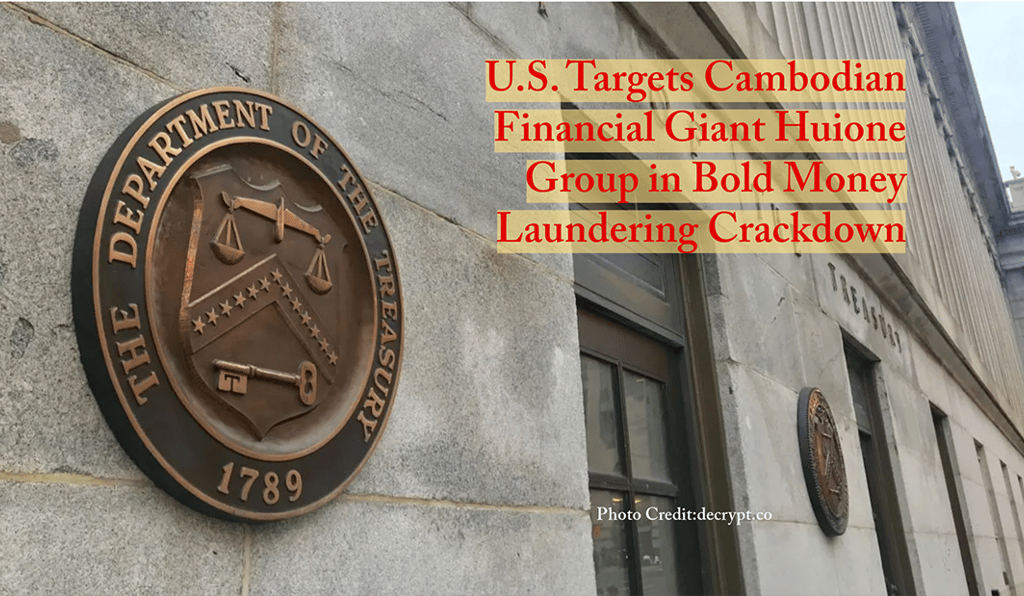U.S. Targets Cambodian Financial Giant Huione Group in Bold Money Laundering Crackdown
5/3/20253 min read


U.S. Targets Cambodian Financial Giant Huione Group in Bold Money Laundering Crackdown
The U.S. Treasury has dropped a financial bombshell, moving to ban Cambodia-based Huione Group from the U.S. banking system over allegations of laundering billions in illicit funds. Labeled a “primary money laundering concern” by the Treasury’s Financial Crimes Enforcement Network (FinCEN), Huione is accused of being a key player in a sprawling network of cyber heists, online scams, and cryptocurrency laundering tied to North Korean hackers and global criminal syndicates. This unprecedented action signals a new chapter in the fight against cross-border financial crime—but what does it mean for the global financial landscape?
A Financial Empire Under Fire
Huione Group, a Phnom Penh-based conglomerate, operates a web of subsidiaries, including Huione Pay, Huione Crypto, and Haowang Guarantee, each allegedly playing a distinct role in laundering illicit proceeds. According to FinCEN, Huione has processed at least $4 billion in illicit funds between August 2021 and January 2025, with some estimates from blockchain analytics firm Elliptic suggesting the group has handled a staggering $98 billion in cryptocurrency since 2014. These funds are linked to notorious schemes like “pig butchering” scams—fraudulent romance and investment ploys—and cyber heists by North Korea’s Lazarus Group, a hacking collective blamed for stealing billions in crypto.
The Treasury’s move, announced on May 1, 2025, invokes Section 311 of the USA PATRIOT Act, a rarely used tool that allows the U.S. to sever foreign entities from its financial system. Treasury Secretary Scott Bessent called Huione the “marketplace of choice” for cybercriminals, emphasizing that the ban aims to disrupt the group’s ability to launder “ill-gotten gains” through U.S. correspondent banking. The proposal is open for public comment for 30 days before it can be finalized, but its implications are already rippling across the financial world.
The Stablecoin Controversy
A key concern is Huoine’s launch of its own stablecoin, the US Dollar Huoine (USDH), in January 2025. Promoted as “censorship-resistant” and immune to freezes, USDH is allegedly designed to bypass traditional banking restrictions, making it a go-to tool for converting illicit crypto into fiat currency. FinCEN warns that this stablecoin creates a “virtually risk-free ecosystem” for money laundering, complicating efforts to track and seize criminal funds. The National Bank of Cambodia revoked Huione Pay’s local banking license in March 2025, citing violations of digital asset regulations, yet the group’s operations continue to raise alarms globally.
Ties to North Korea and Global Scams
Huione’s alleged connections to North Korea’s Lazarus Group have intensified scrutiny. FinCEN reports that at least $37 million of the laundered funds supported North Korean cyber operations, with $150,000 traced directly from Lazarus Group wallets. Additionally, $36 million is linked to pig butchering scams, where victims are lured through fake romantic relationships or investment schemes. Blockchain analysis has tied Huione to major cyberattacks, including the 2024 heist of Japanese exchange DMM, further cementing its role as a hub for illicit finance.
The group’s Telegram-based platform, Haowang Guarantee, is described as a “one-stop shop” for criminals, offering everything from illegal goods to money laundering services. This has made Huione a critical node in Southeast Asia’s growing reputation as a laundering hub, prompting international concern and action, including Google’s removal of Huione’s app from the Play Store earlier this year.
Why This Matters
The U.S. crackdown on Huione is more than a targeted strike—it’s a warning shot to the global financial ecosystem. As cryptocurrencies and stablecoins become tools for both innovation and crime, regulators are under pressure to close loopholes exploited by bad actors. The ban could disrupt Huione’s operations, but it also raises questions about the broader crypto industry. Will other firms face similar scrutiny? And how will emerging markets, where crypto adoption is surging, navigate tightening regulations?
Tom Robinson, co-founder of Elliptic, called the action a “wake-up call” for strengthening defenses against cross-border laundering networks. For everyday consumers, the case underscores the risks of online scams, particularly pig butchering, which has defrauded Americans of billions. Senator Marsha Blackburn’s recent legislation to alert users of dating platforms about known scammers reflects growing political will to tackle these threats.
The Road Ahead
The proposed ban could reshape Huione’s operations, cutting it off from the dollar-based global financial network. Banks worldwide will likely face increased scrutiny of transactions linked to the group, potentially chilling other service providers in the region. However, Huione’s lack of response to the allegations and its continued operations suggest the fight is far from over. As the 30-day comment period unfolds, the world will watch how this high-stakes financial showdown plays out.
What’s at Stake?
This case highlights the collision of technology, crime, and regulation in the digital age. While the U.S. aims to protect its financial system, the global nature of crypto and online scams demands coordinated action. The Huione crackdown could set a precedent for how governments tackle illicit finance, but it also risks pushing criminal activity further underground, where tracking becomes even harder.
Thought-Provoking Questions:
Can global regulators keep pace with the evolving tactics of cybercriminals using cryptocurrencies and stablecoins?
How should governments balance innovation in digital finance with the need to prevent money laundering and fraud?
What role should individuals play in protecting themselves from sophisticated scams like pig butchering in an increasingly digital world?
hello@boncopia.com
+13286036419
© 2025. All rights reserved.